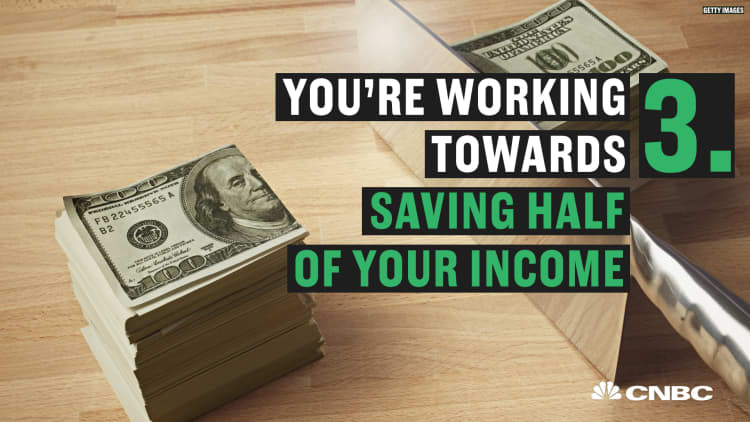Everyone's allowed a few mulligans in their 20s, but by the time you're 30, it's helpful to have a solid grasp on your finances.
To stay on track, consider these nine important money moves to make before you hit 40.
Increase your 401(k) contributions
You should be contributing to your 401(k) plan if your company offers one. The more you can set aside the better, but at minimum, contribute enough to get the full employer match if your company matches funds. It's essentially free money.
Next, you'll want to get in the habit of increasing your contributions consistently, either every six months, at the end of the year or when you get a bonus or a raise.
Check online to see if you can set up "auto-increase," which allows you to choose the percentage you want to increase your contributions by and how often. This way, you won't forget to up your contributions (or talk yourself out of setting aside a larger chunk).

Open more than one retirement account
Enrolling in your employer's 401(k) plan is a good start, but experts say that it may not provide enough to fund your future. It's smart to consider alternate retirement savings accounts too, such as a Roth IRA, traditional IRA and/or health savings account.
Keep in mind that to be financially ready to retire by 67, you should aim to have three times your salary saved by age 40. Review your retirement accounts and make sure you're on track to hit that number.

Open an investment account
Investing is one of the most effective ways to build wealth, and contrary to popular belief, you don't need a lot of money to get started.
In fact, thanks to micro-investing apps such as Acorns, you can start by investing your "spare change." The app will round up your purchases to the nearest dollar and automatically put your coins to work.
Other apps also aim to make investing simple and accessible, and automated investing services known as robo-advisors can help you out, no matter how much you have in the bank. You can also research low-cost index funds, which investing legend Warren Buffett recommends.

Buy the insurance you need
Do you have disability insurance? What about renter's insurance or homeowner's insurance? If you've been putting insurance on the back-burner, it's time to change that in your 30s.
Insurance policies are largely personal. To get the best coverage for your specific situation, educate yourself by shopping around and getting multiple quotes, reading your policy closely before signing on, and asking questions when you don't understand.
Read more about choosing the right insurance plan for you.
Set savings goals for future purchases
You can't get to where you're going if you don't know exactly what you want. Think about what you want your future to look like and then come up precise savings goals. Do you want to be able to afford a home? A vacation home? Trips abroad?
Next, calculate how much you need to save for these future expenditures and for how long, and start setting aside a certain amount each week or month.

Open a 529 savings account
If kids are in your future, you may want to consider opening a 529 savings plan to start putting money away for their education. College costs are already out of control and are only getting more expensive.
A 529 plan allows a parent to contribute up to $14,000 a year — $28,000 for a couple — for each of their children's college educations. It also allows anyone (a grandparent, godparent or even a particularly generous neighbor) to contribute to the fund.
Build up a rainy day fund
Life doesn't always go as planned. You could lose your job, have a medical emergency or deal with a car breaking down. It's important to have a sufficient cushion.
Everyone's situation is different but many experts agree that it's smart to have three to six months' worth of savings tucked away. As for where to stash it, consider a high-yield savings account, certificates of deposit or a portfolio of stocks and bonds.
Take advantage of employee benefits
Does your company offer a health savings account (HSA) or flexible spending account (FSA)? Does it offer commuter benefits or a fitness reimbursement program? If you're not taking advantage of the benefits available to you, you're leaving money on the table.
If you have additional questions about benefits, talk to your human resources department to understand exactly what's available to you.

Make quality purchases
By the time you've hit the big 3-0, it's time to start investing in things that have value. While it may be tempting to try to "save money" by going with the low-quality, cheaper product, oftentimes, choosing quality will save you time and money in the long run.
These can be bigger purchases — such as a nice interview suit or commuter bike — or everyday items, such as a coffee maker, water pitcher or programmable thermostat. In your 30s, start getting used to spending money now in ways that will save you money later.
Don't miss: The 8 most important things to do with your money before turning 30



